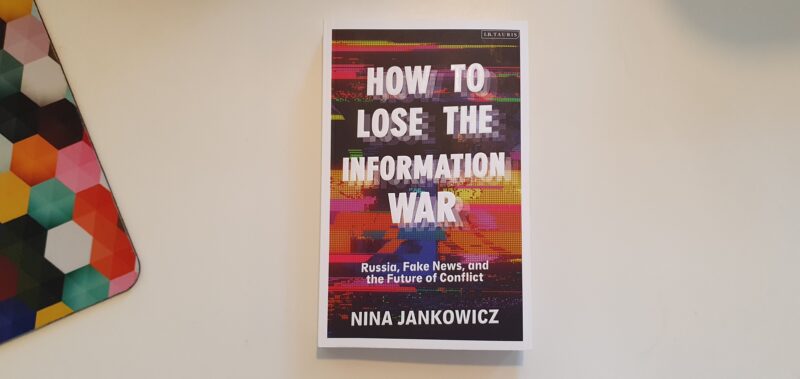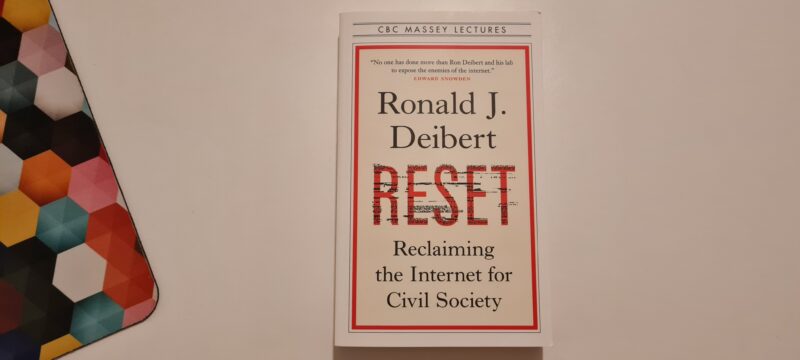I first noticed Nina Jankowicz while reading the report Malign Creativity: How Gender, Sex, and Lies are Weaponized against Women Online. However, I didn’t know Nina was specialized in Central and Eastern Europe, that she has been stationed in Ukraina and knows Russian (thus also being able to understand Polish, Czech and Slovak). Her second book is focused on that same geographical region and, as the title implies, information warfare, directed by Russia. But she weaves the information war of the Czech Republic, Estonia, Georgia, Poland and Ukraine with that of the US, and concentrates on the way to loose information war, but also how to try and tackle it.
“With the advent of the internet and social media, individual citizens are now ‘news’ outlets themselves.” This fact countries like Russia uses against democracies in order to spread false narratives. In the introduction Nina gives us a more thorough dive into The Mueller Report about Russia’s interference prior under during to the presidental election of 2016. It was far more insidious and elaborate than arranging one protest and counterprotest at the same time and location. The Internet Research Agency (IRA) managed to run popular Facebook pages like Blacktivist and Being Patriot, as well as arrange unseemlingly fun and popular protests in Washington D.C.
Nina takes us to five countries that in different ways have tried, and are trying, to fight against Russian information warfare: the Czech Republic, Estonia, Georgia, Poland and Ukraine. In discussions with government officials, politicians and alternative media, she paints a picture of the different ways these countries try to combat Russian interference and pressure. These could provie the US with lessons on how to lose the information war.
The lesson of lessons
When it’s in front of you, it’s completely obvious. You ask yourself why you never saw it or verbally was able to say it out loud. Nina does just this. In the chapter of Estonia, she delves into the issue of the Russian minority, how it’s discriminated against and can’t be part of the Estonian society. This Russia uses to its advantage, to cast doubt on the Estonian government and majority. How to solve?
Whenever we discuss issues related to technology, we tend to see technical solutions. Probably because the tech industry wants it no other way. Probably because we are entranced by technology, living in a technoreligious society, believing in technology as a good force in itself. So, why not simply throw in a tech solution to a tech problem? Like she writes: “How can any administration that intends to protect free speech censor the authentic opinions of its own citizens?”
Why not solve this societal issue with a societal solution instead? Simply put: restore trust in government, give the minority chances to become part of the society as a whole. Try not to evoke bad feelings and animosity between people, heal the rifts. Two important pillars of media literacy (that Taiwan has tried) are schools, as in Finland, and public libraries and the powerful information and searchability librarians hold to guide citizens in the endless stream of information and literature. Thus Russia can no longer use this issue to splinter relations between people and create even bigger rifts. Because one thing Russia does is never to invent new issues, but use the old societal problems to sow discord and splinter society and the nation.
Downsides
Four downsides with the book:
It was published just after Joe Biden was installed as president of the Unites States, thus missing the Biden administration’s take on cyber warfare, dual-use technologies, spyware and transnational repression. It differs from previous administrations.
It was published one year before the Russian war against Ukraina in 2022, which renders some of the politics described obsolete. For instance, Estonia has once more turned more suspicious of the Russian minority, meaning that, for instance, the chapter on Estonia is not up to date, although it’s still relevant as a historical lesson. Settings for information warfare have changed rather drastically in one year.
Somehow, I really dislike fictional writings “capturing” a technology and its implication in the present or future. Carissa Véliz does it in Privacy is power. Nina does it, and it’s erroneous, partly because it’s written before Biden’s presidency, partly because it’s the usual bleak, dry, predictable onset to an issue now, set in 2028.
In the chapter about Ukrainian efforts to provide positive aspects of Ukraine in the Dutch election about EU-legislation should have been problematized more. Even though the Russians seemed to have played a part in negative campaigning, the Ukrainian part could also be considered foreign interference in an election. Julia Slupska’s piece on election interference is well-worth a read.
Summary
The book is true to its’ title. Information warfare pervades the book, and it doesn’t confuse information warfare with espionage or cyber warfare. Terms here are very important and so are the differences between them. Although Russia is the focal point, which narrows the scope of information warfare, that’s an advantage here. To write about information warfare in general or include Chinese, Iranian, American or any other country, would water it down. One can’t cover everything to make a topic or an issue interesting.
Lessons from the book are important and relevant. Countries must learn from one another, can’t hide from information warfare, and develop a battery of counter measures. And those counter measures are seldom technological, but rather societal, economical and political. That’s the most important things I learned reading this book.

